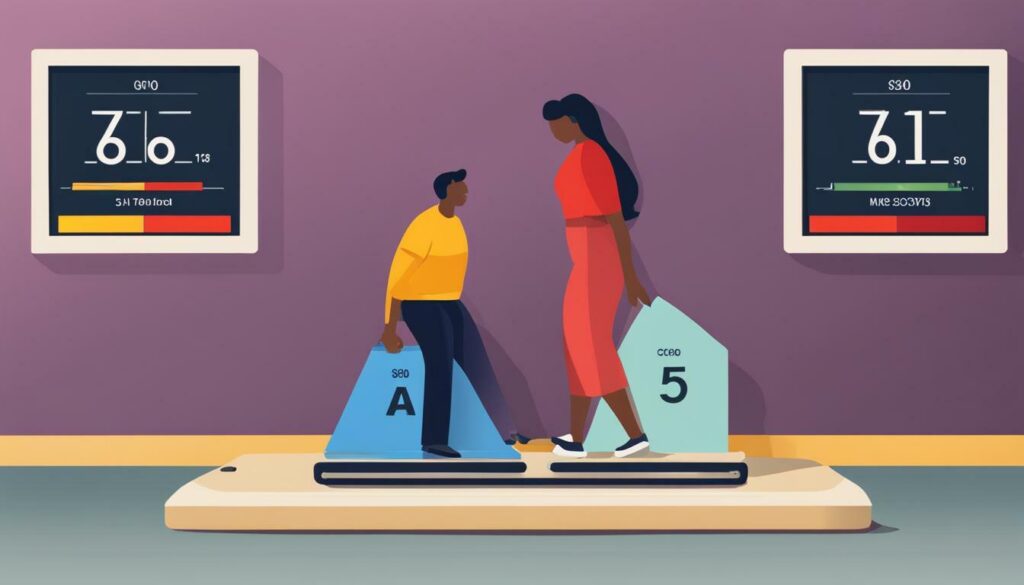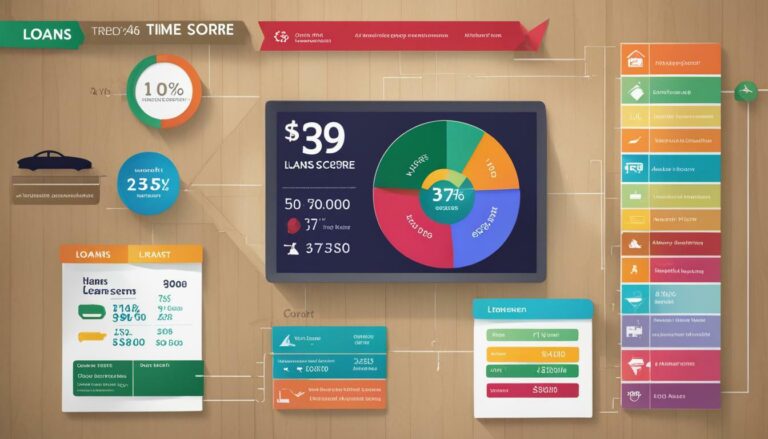Understanding the Emotional Impact of Credit Scores on You

Your credit score is not just a number; it has a profound emotional impact on your life and overall well-being. It’s important to recognize how credit scores can affect your emotional state and understand the connection between your creditworthiness and your personal and financial well-being.
When your credit score is low, it can lead to feelings of frustration, anxiety, and even shame. Poor credit ratings can leave you feeling hopeless and trapped, making it difficult to access affordable credit and housing. The emotional consequences of bad credit scores can be long-lasting and affect various aspects of your life.
Key Takeaways:
- A low credit score can lead to feelings of frustration, anxiety, and shame.
- Poor credit ratings can affect your access to affordable credit and housing.
- The emotional consequences of bad credit scores can have a long-lasting impact on your life.
- Understanding the link between credit scores and emotions is crucial for managing your financial well-being.
- Improving your credit score and adopting responsible financial behaviors can help alleviate the emotional burden.
The Psychological Effects of Credit Scores
Your credit score can have significant psychological effects, especially if you are already dealing with mental health challenges. Understanding the emotional implications of credit scores is crucial, as they can impact your overall well-being. Research has shown a strong connection between financial difficulty, mental health problems, and poor credit ratings. When faced with financial stress and the fear of negative credit outcomes, individuals may experience heightened levels of anxiety, depression, and feelings of helplessness.
The complexity of the credit rating system adds another layer of stress, making it overwhelming for individuals to navigate. The jargon, different credit agencies, and the lack of transparency can make it difficult to understand and manage your credit score effectively. This confusion can further exacerbate the emotional toll, leaving individuals feeling trapped and ashamed. The emotional consequences of a poor credit score can have lasting effects on your access to affordable credit, housing, and overall financial stability.
🚨 TUIC Errors + Low Credit Score?
CreditScoreIQ helps you build credit faster by reporting utility bills to all 3 bureaus—while you dispute errors.
Start Building Credit Today →Emotions also play a significant role in financial behaviors, which in turn can impact credit scores. Stress, anxiety, and impulsiveness can lead to poor financial decision-making, such as missed payments or excessive borrowing, resulting in negative credit outcomes. It is important to recognize these tendencies and develop strategies to break negative behavioral patterns. Adopting responsible financial behaviors and developing a growth mindset can help improve your credit score and overall financial well-being.

In summary, credit scores have profound psychological effects, especially for individuals already dealing with mental health challenges. The complexity of the credit rating system, combined with the emotional toll of a poor credit score, can lead to feelings of helplessness and shame. It is important to understand and manage your credit score to minimize the psychological consequences. By breaking negative behavioral patterns, adopting responsible financial behaviors, and developing a growth mindset, you can improve your credit score and achieve greater financial well-being.
The Stress of Credit Scores
The stress of managing and improving your credit score can be incredibly overwhelming, adding to the already existing financial pressures. The emotional toll of this stress can have long-lasting effects on your overall well-being. Research has shown that individuals with poor credit ratings often experience feelings of hopelessness, being trapped, and even shame.
According to a study conducted by the National Foundation for Credit Counseling, financial difficulty is closely linked to mental health problems, with individuals facing financial challenges being more prone to anxiety and depression. The fear of the unknown, the burden of missed payments, and the constant worry about potential financial repercussions can all contribute to heightened stress levels.
In fact, a recent survey found that 72% of respondents reported feeling stressed about their credit scores, with 23% admitting to losing sleep over it. The complexity of the credit rating system exacerbates this stress, making it difficult for individuals to navigate and understand how their financial decisions impact their credit scores.
“The fear of the unknown, the burden of missed payments, and the constant worry about potential financial repercussions can all contribute to heightened stress levels.”
To illustrate the impact of stress on credit scores, consider the following example:
| Financial Behavior | Stress Level | Credit Score |
|---|---|---|
| Consistently pays bills on time | Low stress | Good credit score |
| Misses payments frequently | High stress | Poor credit score |
As you can see, stress levels directly influence credit scores. When under significant stress, individuals may make impulsive decisions or overlook important financial responsibilities, leading to negative credit outcomes.
Managing stress related to credit scores is crucial for your overall well-being. Developing healthy coping mechanisms, seeking support from financial advisors or counselors, and adopting responsible financial behaviors can all help alleviate stress and improve your credit score over time.

Your credit score can significantly impact your self-esteem, especially if you are dealing with a bad credit rating. The emotional consequences of a poor credit score can be far-reaching, affecting your sense of self-worth and overall well-being. It’s important to understand how your credit score is determined and take proactive steps to improve it, as this can help alleviate the negative emotions associated with a low credit rating.
When you have a bad credit score, it can feel like you’re being judged or labeled as financially irresponsible. This can lead to feelings of shame, embarrassment, and a sense of being trapped in a cycle of financial difficulties. Your credit score becomes a source of constant worry, affecting your confidence and self-esteem in various aspects of your life.
According to a study published in the Journal of Economic Psychology, individuals with lower credit scores tend to have higher levels of perceived financial stress and lower levels of self-esteem. The study also found that those with poor credit ratings were more likely to engage in negative financial behaviors, such as impulse buying and overspending, as a result of their emotional distress.
It’s important to remember that your credit score is not a reflection of your personal worth. It is merely a tool used by lenders to assess your creditworthiness. Taking steps to improve your credit score, such as paying bills on time, reducing debt, and disputing any errors on your credit report, can help you regain control over your financial situation and boost your self-esteem. Remember, your credit score does not define you, and with time and effort, you can rebuild your credit and improve your overall financial well-being.

| Emotional Consequences of Bad Credit Scores: |
|---|
| Feelings of shame and embarrassment |
| Low self-esteem and confidence |
| Perceived financial stress |
| Engagement in negative financial behaviors |
Financial Behaviors and Credit Outcomes
Emotions have a significant influence on your financial behaviors, and they can greatly impact your credit outcomes. When you are stressed or anxious about your financial situation, you may be more likely to make impulsive decisions, such as overspending or taking on excessive debt. These impulsive behaviors can lead to missed payments and a negative credit rating.
It is important to identify and understand the emotions that drive your financial behaviors. Stress, for example, can cloud your judgment and lead to rash decisions that have long-term consequences. By recognizing your emotional triggers and learning healthy coping mechanisms, you can better manage your finances and make more responsible choices.
Developing a budget and setting financial goals can also help you regulate your emotions and make informed decisions. Having a clear plan in place can provide a sense of security and reduce the likelihood of impulsive spending. Additionally, seeking support from financial advisors or credit counselors can provide guidance and accountability, helping you stay on track towards improving your credit outcomes.
| Emotional Triggers | Healthy Coping Mechanisms |
|---|---|
| Stress | Engaging in stress-relieving activities such as exercise, meditation, or talking to a trusted friend or family member |
| Anxiety | Practicing mindfulness techniques, deep breathing exercises, or seeking therapy |
| Impulsiveness | Waiting 24 hours before making non-essential purchases, creating a list of needs versus wants, or seeking financial counseling |
Remember, managing your emotions is a crucial part of managing your financial well-being. By recognizing the impact emotions can have on your financial behaviors, you can take proactive steps to improve your credit outcomes and secure a healthier financial future for yourself.

Emotions play a significant role in your financial behaviors, ultimately affecting your credit outcomes. Stress, anxiety, and impulsiveness can lead to poor financial decisions, resulting in missed payments and a negative credit rating. To mitigate these negative impacts, it is important to identify your emotional triggers and develop healthy coping mechanisms. Creating a budget, setting financial goals, and seeking support from professionals can also contribute to positive financial behaviors and improved credit scores. By managing your emotions, you can take control of your financial well-being and set yourself on a path towards financial success.
Breaking Negative Patterns and Adopting Responsible Behavior
Breaking negative patterns and adopting responsible financial behavior is key to improving your credit scores and transforming your financial future. Understanding the emotional impact of credit scores is crucial, as it can have long-term psychological consequences. Studies have shown that people with mental health problems are more likely to experience financial difficulty, leading to missed payments and a poor credit rating.
The complex nature of the credit rating system only adds to the confusion. With its jargon and different credit agencies, it can be overwhelming for individuals to navigate and manage their credit scores effectively. It is essential to acquire the knowledge and tools necessary to understand and improve your credit rating.
Poor credit ratings can have significant emotional consequences. They can leave individuals feeling hopeless, trapped, and ashamed, impacting their access to affordable credit and housing. It is crucial to prioritize your mental well-being by taking proactive steps to improve your credit scores.
The Role of Emotions in Financial Behaviors
Emotions also play a role in financial behaviors. Stress, anxiety, and impulsiveness can contribute to negative credit outcomes. When individuals are overwhelmed by financial stress or anxiety, they may make impulsive decisions that negatively affect their credit scores. By understanding the emotional triggers behind these behaviors, it becomes possible to develop healthier financial habits.
To break negative behavioral patterns, it is essential to adopt responsible financial behaviors. This includes creating a budget, living within your means, and practicing good debt management. It also involves developing a growth mindset, where you view mistakes as opportunities for learning and growth.

By taking control of your financial habits, you can improve your credit scores and overall financial well-being. Remember, it’s never too late to start on a path towards financial stability. Take the necessary steps today to break negative patterns and transform your financial future.
| Responsible Financial Behaviors | Breaking Negative Behavioral Patterns |
|---|---|
| Creating a budget and sticking to it | Identifying triggers for impulsive spending |
| Living within your means | Seeking professional help if needed |
| Practicing good debt management | Developing a growth mindset towards finances |
Understanding the Credit Rating System
The credit rating system can be confusing and overwhelming, with its complex terminology and various credit agencies. Navigating through the intricacies of credit scores becomes crucial for individuals aiming to manage their financial well-being effectively. It is essential to comprehend how credit agencies evaluate creditworthiness and the factors that contribute to credit scores.
One of the primary challenges individuals face is deciphering the jargon associated with credit scores. Terms like credit utilization ratio, derogatory marks, and revolving accounts can feel like a foreign language to many. Understanding the meaning and implications of these terms is vital in comprehending the factors that influence credit scores and taking necessary actions to improve them.
Furthermore, it’s important to recognize that different credit agencies exist, each with their own credit scoring models. These agencies, such as Experian, Equifax, and TransUnion, collect and analyze credit data, resulting in variances in credit scores across agencies. Therefore, it is crucial to monitor and understand the credit scores reported by each agency to get a comprehensive view of one’s creditworthiness and ensure the accuracy of the information.
“The credit rating system can be confusing and overwhelming, with its complex terminology and various credit agencies.”
How Credit Agencies Evaluate Creditworthiness
Credit agencies assess creditworthiness based on several factors, including payment history, credit utilization, length of credit history, types of credit, and new credit applications. By understanding the weightage given to each factor, individuals can make informed decisions to improve their credit scores. For instance, making timely payments and keeping credit card balances low can positively impact credit scores.
A comprehensive understanding of the credit rating system empowers individuals to take proactive steps towards managing their finances effectively. It allows them to address weaknesses, rectify errors, and establish responsible financial behaviors to achieve better credit outcomes. Developing this knowledge can help individuals navigate the credit landscape with confidence.
Summary
- The credit rating system can be confusing and overwhelming, with its complex terminology and various credit agencies.
- Understanding the credit scoring factors and their implications is essential for managing credit scores effectively.
- Different credit agencies have their own credit scoring models, and it is important to monitor credit scores across all agencies.
- By understanding the credit rating system, individuals can make informed decisions to improve their creditworthiness.
- Recognizing the weightage given to each factor allows individuals to develop responsible financial behaviors and achieve better credit outcomes.
| Credit Rating Factors | Key Actions |
|---|---|
| Payment History | Make timely payments and avoid missed payments. |
| Credit Utilization | Keep credit card balances low and avoid maxing out credit limits. |
| Length of Credit History | Maintain a long credit history by keeping old accounts open and active. |
| Types of Credit | Diversify credit portfolio by having a mix of installment loans and revolving credit. |
| New Credit Applications | Avoid excessive credit applications within a short period. |
Conclusion
Understanding the emotional impact of credit scores is crucial for your personal and financial well-being, as it can have long-lasting consequences. Research has shown that individuals with mental health problems are more likely to experience financial difficulty, leading to missed payments and ultimately a poor credit rating. This can create a cycle of stress and anxiety, further exacerbating mental health issues.
The complexity of the credit rating system adds to the confusion, making it overwhelming for individuals to understand and manage their credit scores effectively. With its jargon and the existence of different credit agencies, it becomes challenging to navigate through the system and make informed decisions about your financial health.
Poor credit ratings can significantly impact your access to affordable credit and housing options, leaving you feeling hopeless, trapped, and ashamed. It is important to recognize that your credit score does not define your worth as a person, but it does play a crucial role in your financial opportunities and stability.
Emotions also play a significant role in financial behaviors. Stress, anxiety, and impulsiveness can lead to poor decision-making, resulting in negative credit outcomes. However, by breaking negative behavioral patterns, adopting responsible financial behaviors, and developing a growth mindset, you can take control of your credit score and improve your overall financial well-being.
FAQ
Q: What is the emotional impact of credit scores?
A: Understanding the emotional impact of credit scores is essential as it can have long-term psychological consequences. Poor credit ratings can leave individuals feeling hopeless, trapped, and ashamed, impacting their access to affordable credit and housing.
Q: How do credit scores affect mental health?
A: People with mental health problems are more likely to be in financial difficulty, which can lead to missed payments and a poor credit rating. This can further exacerbate existing mental health issues and create additional stress and anxiety.
Q: Why is the credit rating system overwhelming?
A: The credit rating system can be overwhelming for individuals to understand and manage due to its complexity, jargon, and the existence of different credit agencies. This complexity adds to the confusion and can make it difficult for individuals to navigate and improve their credit scores.
Q: How do emotions impact financial behaviors?
A: Emotions such as stress, anxiety, and impulsiveness can play a significant role in financial behaviors. These emotions can lead to negative credit outcomes, such as impulsive spending, missed payments, and poor financial planning.
Q: How can individuals break negative patterns and improve their credit scores?
A: Breaking negative behavioral patterns and adopting responsible financial behaviors is crucial to improving credit scores and overall financial well-being. Developing a growth mindset, seeking financial education, and prioritizing responsible financial habits can help individuals improve their credit scores.
Q: Why is it important to understand the credit rating system?
A: Understanding the complexity of the credit rating system and how it works is essential for individuals to effectively manage their credit scores. This knowledge allows individuals to navigate the system, dispute inaccuracies, and take proactive steps to improve their creditworthiness.
Ready to Improve Your Credit?
Disputing TUIC errors is step one. Step two? Boost your score by reporting utility payments with CreditScoreIQ.
Get Started Now (Only $1 Trial) →3-bureau reporting • $1M identity insurance • Dark web monitoring






